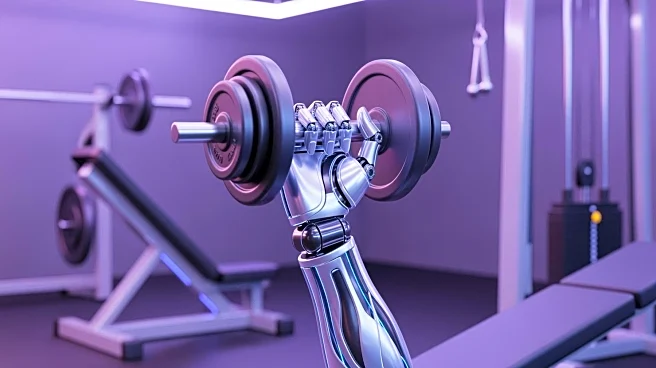What's Happening?
The use of AI as a muscle-building coach is being explored as an alternative to traditional personal trainers. Amanda Smith, a journalist, shares her experience of using AI to complement her fitness journey, which includes strength training and muscle maintenance.
AI tools like ChatGPT provide personalized health advice based on user data, offering dietary and exercise recommendations. Smith uses AI to supplement the guidance from her human trainer, focusing on hormonal balance and nutritional macros. The AI suggests adjustments to her diet and exercise routine, aiming to improve her body composition and support her fertility goals.
Why It's Important?
The integration of AI in fitness coaching represents a significant shift in how individuals approach personal health and wellness. AI offers accessible and personalized advice, potentially reducing the need for costly personal trainers. This democratization of fitness guidance can benefit those who may not have the means to hire a trainer, providing them with tailored recommendations based on their health data. However, the reliance on AI also raises questions about the accuracy and safety of its advice, especially concerning sensitive health information. The balance between AI and human expertise is crucial to ensure effective and safe fitness outcomes.
What's Next?
As AI continues to evolve, its role in fitness and health coaching is likely to expand. Future developments may include more sophisticated algorithms that can provide even more personalized and accurate advice. The collaboration between AI and human trainers could lead to hybrid models of fitness coaching, combining the strengths of both approaches. Additionally, ongoing research and user feedback will be essential in refining AI tools to better meet individual needs and address potential limitations. The fitness industry may see increased adoption of AI technologies, influencing how people approach health and wellness.
Beyond the Headlines
The use of AI in fitness coaching highlights broader ethical and privacy concerns related to data sharing and AI decision-making. Users must be cautious about the information they provide to AI tools, considering potential data breaches and misuse. The reliance on AI also raises questions about the diminishing role of human interaction in personal health, which can impact motivation and accountability. As AI becomes more integrated into daily life, society must navigate the balance between technological convenience and the preservation of human expertise and connection.
















